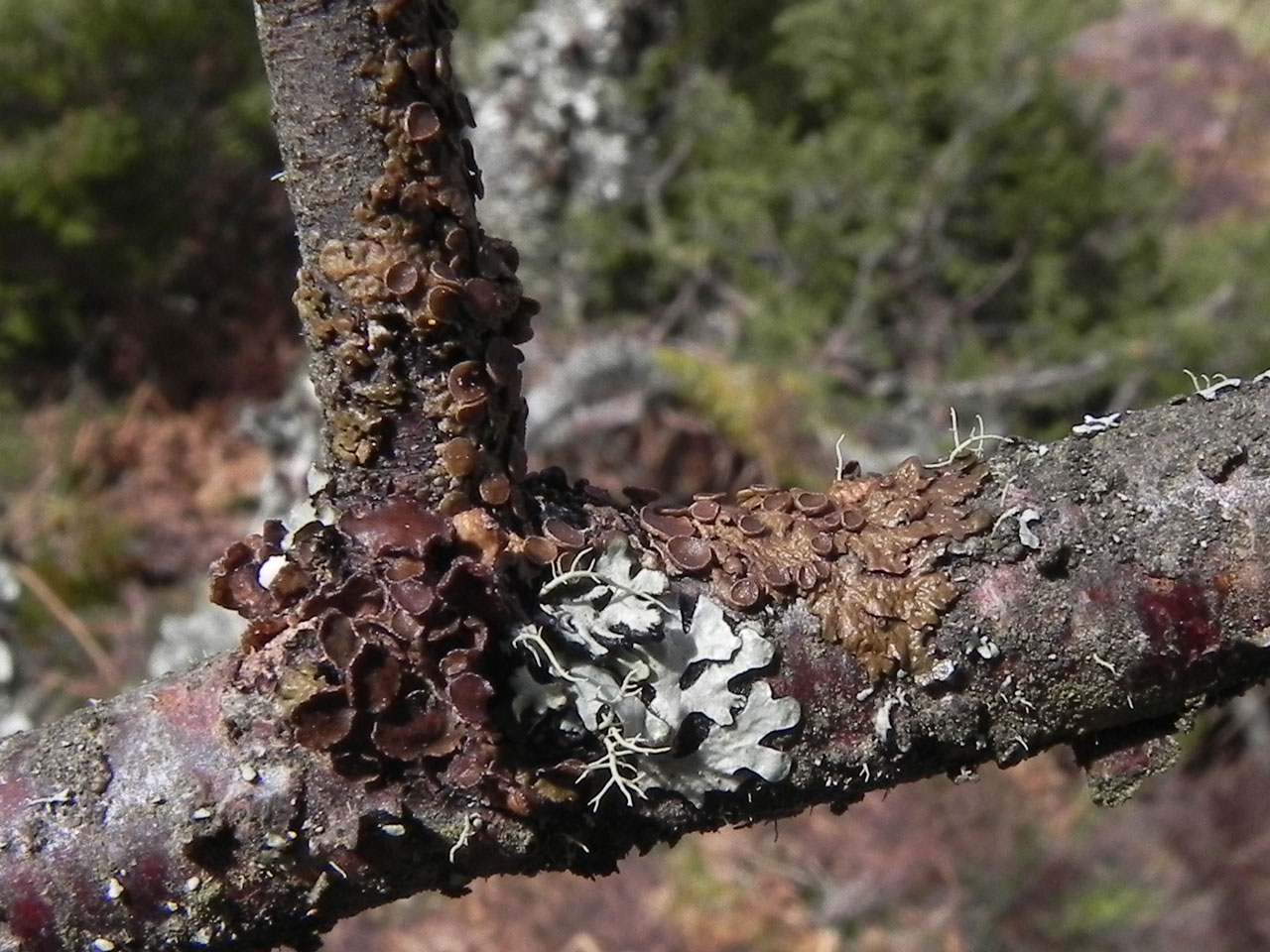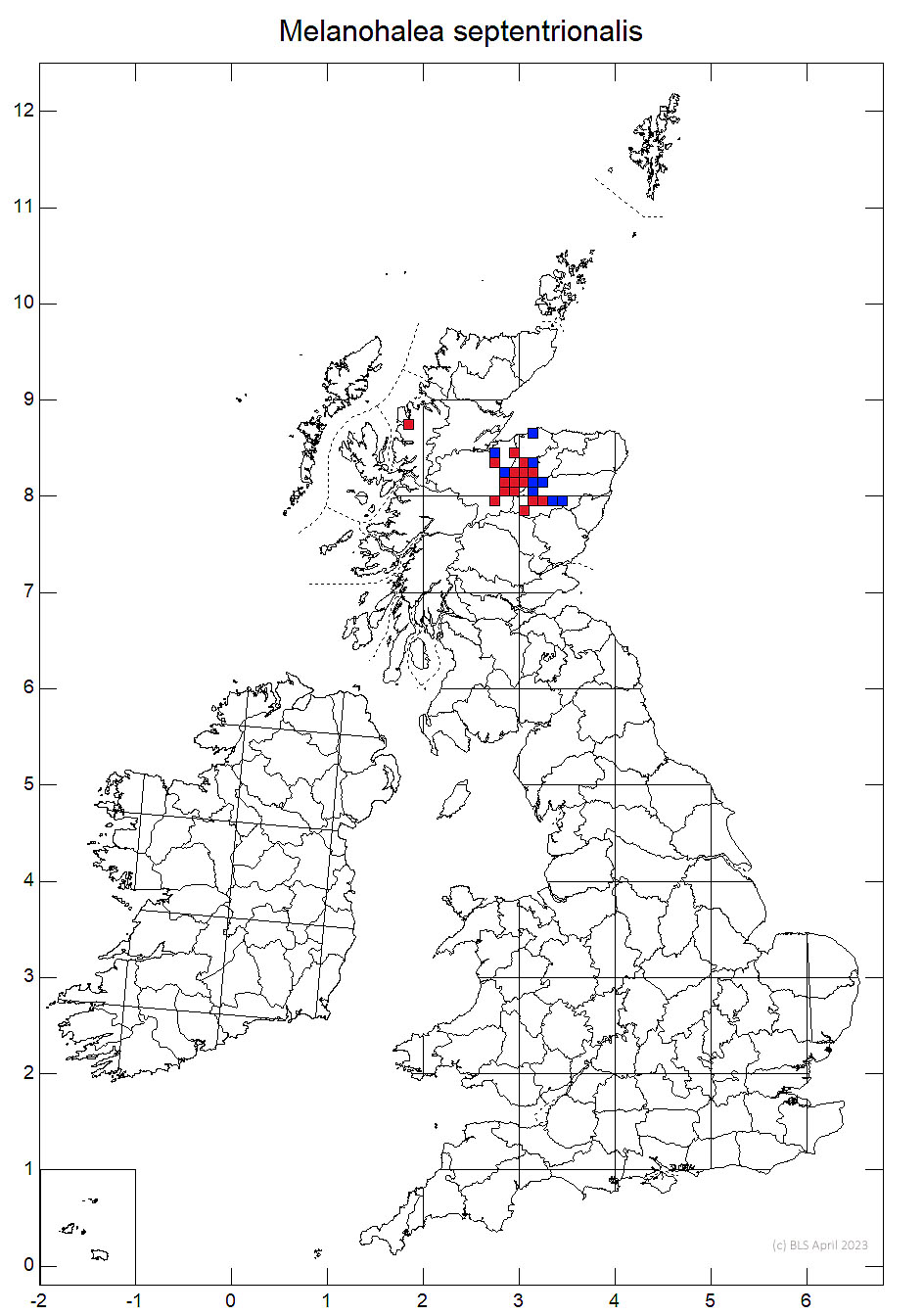Melanohalea septentrionalis
Parmelia septentrionalis
A small brown Parmelia, found closely appressed to the twigs of Birch in the eastern Highlands. The upper surface is red or dark brown, shiny at the margins and with small dot-like pseudocyphellae appearing like scattered white dots. Apothecia abundant, often crowded and overlapping. Not rare but confined to straths with boreal sub-oceanic climates around the Cairngorms.
Thallus forming small rosettes, 1–3 (–5) cm diam., closely appressed, occasionally with upturned lobe apices, thin; lobes 1–3 (–5) mm broad, flat to somewhat convex, discrete to overlapping with ± wavy margins; upper surface red- or dark brown, frequently pitted, shiny at the margins; pseudocyphellae small, dot-like, appearing like scattered white dots (with hand lens); lower surface pale to dark brown; rhizines unbranched, scattered, pale to dark brown. Apothecia abundant, often crowded and overlapping, covering most of the thallus apart from the extreme margin, 0.5–3 (–5) mm diam.; disc red-brown, concave when immature, becoming flat and undulating; thalline margin thin, smooth with many pseudocyphellae. Ascospores 9–13 × 5–8 μm, ellipsoidal. Conidia 5–6.5 × ca 1 μm, bacilliform. Cortex K–, N–; medulla C–, K–, KC–, Pd+ orange-red, UV– (fumarprotocetraric and protocetraric acids).
Forms small, neat, richly fertile thalli. The occurrence on Birch in Britain is unusual as it is normally reported on Grey Alder and Willow abroad. Melanelia olivacea (L.) Ach. (1803), unknown in Britain, has a more wrinkled, matt thallus, a broader more distinct marginal zone without apothecia and a crenulate thalline exciple. It has been incorrectly reported from Scotland.
Mainly on twigs of Birch in well-lit open situations, especially margins of woods, often with Cetraria sepincola and Tuckermannopsis chlorophylla.

Very local. N.E. Scotland (Cairngorm region).
Very localised to sub-oceanic areas of the eastern Highlands, but as a pioneer species of twigs on young Birches not obviously threatened
Britain: Notable
Cannon, P., Divakar, P., Yahr, R., Aptroot, A., Clerc, P., Coppins, B., Fryday, A., Sanderson, N. & Simkin, J. (2023). Lecanorales: Parmeliaceae, including the genera Alectoria, Allantoparmelia, Arctoparmelia, Brodoa, Bryoria, Cetraria, Cetrariella, Cetrelia, Cornicularia, Evernia, Flavocetraria, Flavoparmelia, Hypogymnia, Hypotrachyna, Imshaugia, Melanelia, Melanelixia, Melanohalea, Menegazzia, Montanelia, Nesolechia, Parmelia, Parmelina, Parmeliopsis, Parmotrema, Platismatia, Pleurosticta, Protoparmelia, Pseudephebe, Pseudevernia, Punctelia, Raesaenenia, Tuckermannopsis, Usnea, Vulpicida and Xanthoparmelia. Revisions of British and Irish Lichens 33: 1-98.
Text by N A Sanderson, based on Cannon et al (2023).

